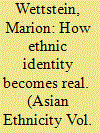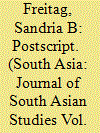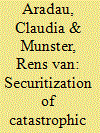|
|
|
Sort Order |
|
|
|
Items / Page
|
|
|
|
|
|
|
| Srl | Item |
| 1 |
ID:
144690


|
|
|
|
|
| Summary/Abstract |
Taking the material and performative world of the Nagas in Northeast India by way of example, this paper examines how identity, above all ‘ethnic’ identity, is manifested and gets incorporated into the understanding that people have of themselves. Following the shifts in identity over time by comparing ritual performances at the turn of the last century with present-day festivals in Nagaland, it is argued that the enactment of identity roles in public performative events provides a mechanism that makes identity concepts such as ‘ethnic identity’ real to people. The liminoid state during the performance enables individuals to live through identity roles emotionally, mentally, and somatically. It is suggested that the enactment of identity roles in public performances can thus be taken as a key to explain why and how identities can shift over time and between contexts.
|
|
|
|
|
|
|
|
|
|
|
|
|
|
|
|
| 2 |
ID:
140464


|
|
|
|
|
| Summary/Abstract |
This essay suggests the expanded scholarly terrain created to analyse ‘the public’ that has been mapped between an initial special issue of the journal South Asia: Journal of South Asian Studies (published in 1991) and this current essay collection (of 2015). In the process, it suggests not only what new scholarly interests and skills, as well as new sites for analysis, have opened up, but also points to issues yet unaddressed, along with elements of visual culture that scholars interested in ‘the public’ could consider. For the realm of the visual remains, even after 25 years, largely unconnected to analyses of ‘the public’, despite its centrality to the ways in which public issues, enactments and interests are expressed and debated. To provide overarching ways to think about how the essays presented here treat ‘the public’, as well as to draw attention to issues still not addressed that offer future challenges, this essay suggests conceptualising the subject around four aspects that emerged when the authors met together: the public as enacted; the public as envisioned; public space, both rhetorical and actual; and concepts of the public expressed as belief, interpretation, understandings, values and ‘public opinion’—that is, as concepts understood to motivate and influence their audiences.
|
|
|
|
|
|
|
|
|
|
|
|
|
|
|
|
| 3 |
ID:
114568


|
|
|
|
|
| Publication |
2012.
|
| Summary/Abstract |
Psychological knowledge has become incorporated into a range of security practices, discourses, and interventions in catastrophic events, including terrorism. By engaging the existing literature on the medicalization and psychologization of security, this article reads the enactment knowledge deployed in preparedness exercises from the perspective of psychodrama and sociodrama rather than that of psychoanalysis or psychosocial risk management. Enactment has become an important mode of knowledge for the governance of terrorism, as preparedness exercises deploy action methods, drama, enactment, and performance to prepare for unexpected, catastrophic events. Taking seriously the conceptualization of enactment, as deployed in psychodrama and sociodrama, can also challenge the securitization of catastrophic events. The article concludes that enactment, which foregrounds action rather than speech, and suggests that meaning follows action, can also offer critical insights into securitization theory.
|
|
|
|
|
|
|
|
|
|
|
|
|
|
|
|
|
|
|
|
|